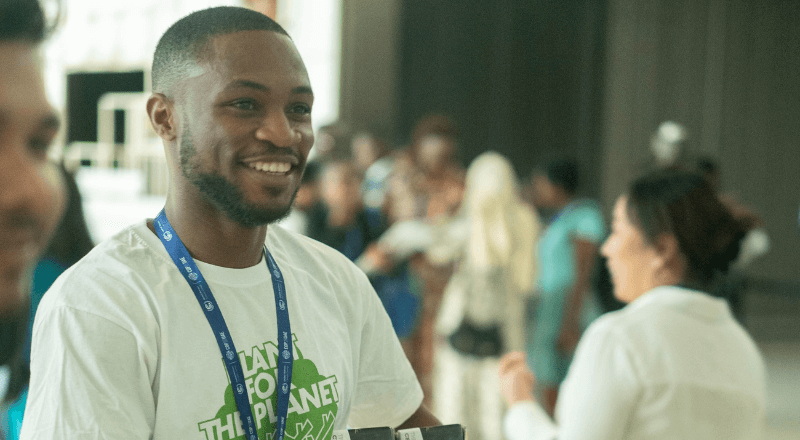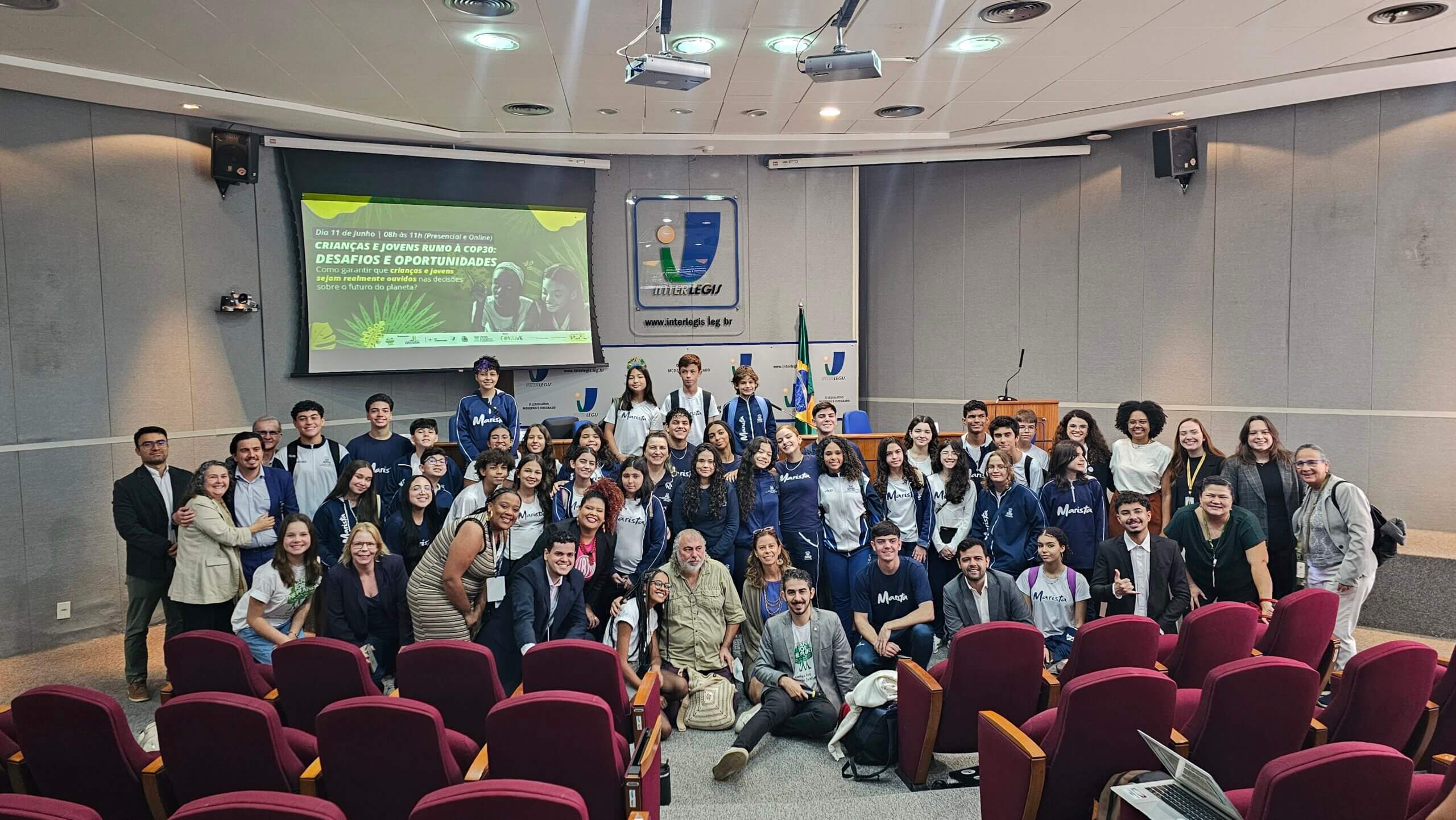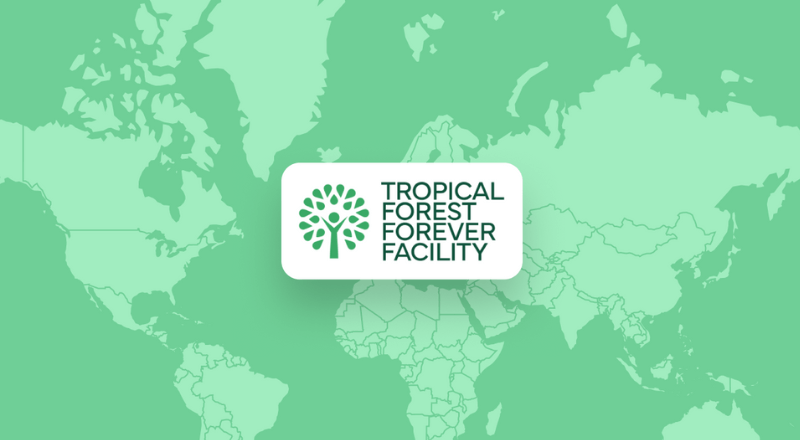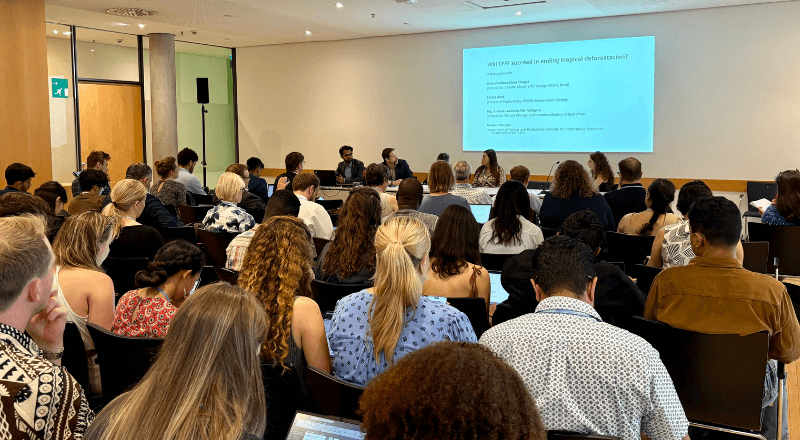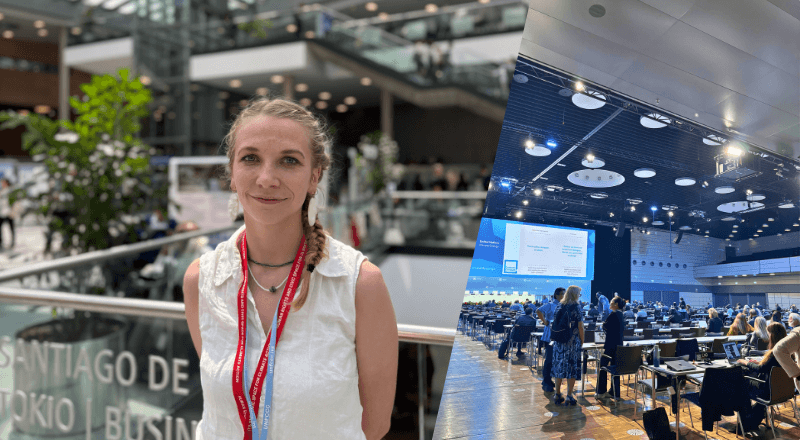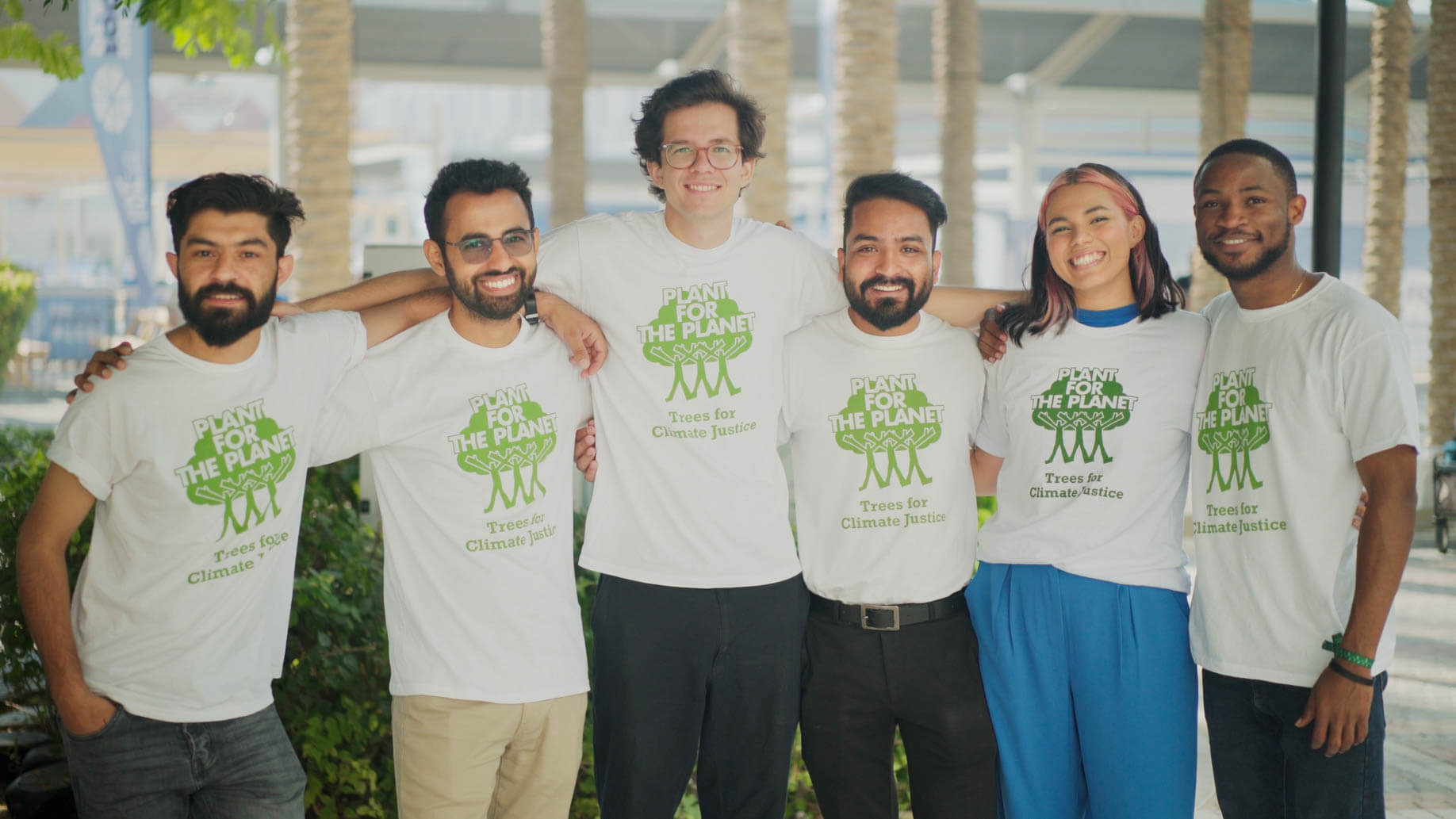
Jule Schnakenberg, long-time Climate Justice Ambassador and Plant-for-the-Planet employee, reports on her impressions of COP 28 in Dubai. She contributed to the COP 28 delegation of Plant-for-the-Planet, which comprised 20 young individuals and partners representing over 10 different countries:
“The United Nations Framework Convention on Climate Change, COP 28, took place in Dubai from 30/11 to 13/12/2023. A lot was discussed over the course of two weeks: the first-ever Global Stocktake took place, the Loss & Damage Fund was adopted by parties, the Global Goal on Adaptation and Article 6 was negotiated, the alignment of finance flows, the nexus between climate change and human rights, health, oceans, biodiversity and women and children, indigenous peoples, cities and rural communities.
We welcome the progress states have made, the increasing recognition of people with disabilities in climate policies. We also appreciate the advancements and developments on the nature, land use and climate front, the financial pledges. Read a summary of the nature-related outcomes from COP 28 here.
However, we would like to also echo calls by fellow civil society leaders and organizations, who have critiqued that no strong language was agreed upon by parties in relation to phasing out fossil fuels. More must be done! Fast, funded and equitable!
We were privileged enough to be able to accredit 20 young people and partners from more than 10 different countries. We organized an official side-event at COY18, the 18th Conference of Youth, which took place right before the actual Conference of Parties.
We also organized two thought-provoking official side-events at COP 28 together with partners.
From 1 – 3 December 2023, our Climate Justice Ambassadors had a booth, to which we invited those interested in learning more about the work of Plant-for-the-Planet to speak to us.

We distributed 15 000 bars of our beloved Change Chocolate.

Many of our big climate heroes received a bar of this fair trade goodness, including Brazil’s Minister for Indigenous Peoples, the President of the EU Commission, the Prime Minister of Sweden, the Brazilian Minister for the environment, heads of delegations, journalists and civil society representatives.
Our ambassador Caterina became a part of the YOUNGO Global Coordination Team, where she took on the role of the actions coordinator. This involved briefing the official UN Youth Constituency on their daily activities, assisting fellow youth activists in planning and organizing demonstrations, and reminding everyone about the regulations set by the United Nations Framework Convention on Climate Change (UNFCCC).
In addition to this, our delegates followed negotiations, joined bi-laterals, actions organized by other organizations, learned and spoke at side-events, connected with dozens of like-minded (young) people.

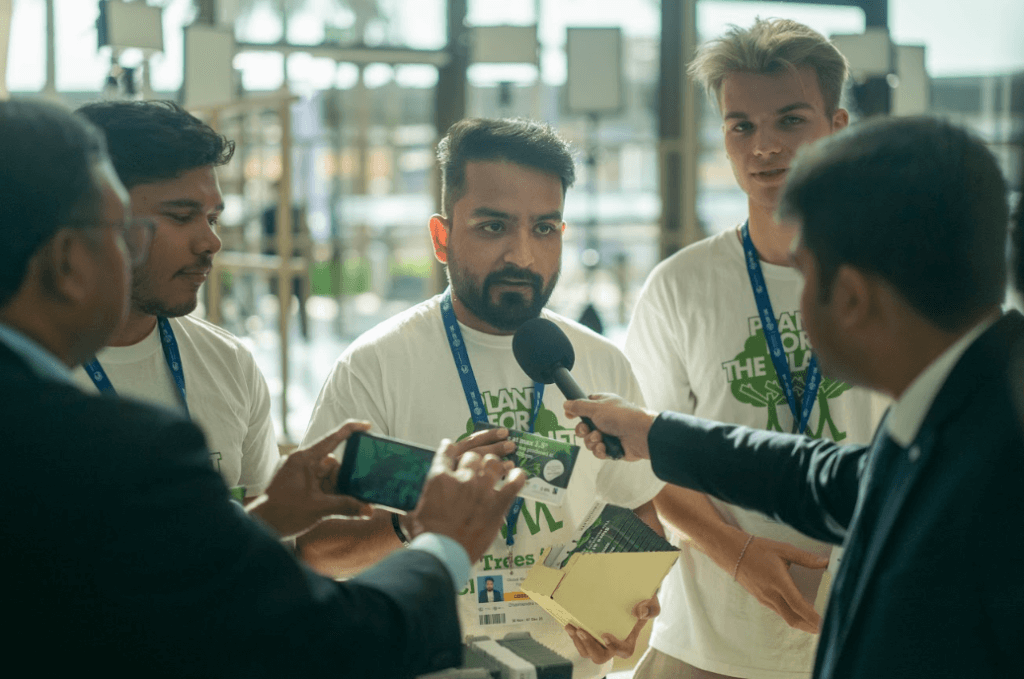
Our work was featured in numerous international media outputs, including the following:
- “We are the young…” in The News on Sunday
- Interview with our Ambassador Johann about our COP Choc for Doordarshan (DD), an Indian state television station
- The Innovators Magazine interviewed Caterina and Johann for their OnePoint5Media video podcast show
- Frankfurter Rundschau and Klimareporter, nd and KNews mentioned our Change Chocolates
- Our Ambassador Caterina was interviewed by the newspaper Die Harke
The Side-Events
Side-Event 8th Dec: Breaking Barriers: Gender-transformative Education as a Catalyst for Climate Justice – Friday 8th December, 3.00 – 4.30pm in Side-Event Room 2
The event was opened by Fatou Jeng, Youth Climate Advisor to the UN Secretary General.
Speakers of the event include
- Hon. Awut Deng Achuil, Minister of General Education and Instruction, South Sudan
- Aline Cardoso, Secretary of Economic Development and Labor of Sao Paulo, Brazil
- Madam Gaye, Lead Coordinator on Gender for the African Group of Negotiators
- Dr. Angela Baschieri, Technical Lead on Climate Change, UNFPA
- Renata Koch Alvarenga (EmpoderaClima),
- Kehkashan Basu, Green Hope Foundation
- Nelly Beatriz Yaguachi Caiza – Because I Am A Girl Movement, Plan International
- Valentine Chepkoech – GPE Youth leader
- Nimo Hassan, Director of the Somali NGO Consortium
- Anabel Ternes, a distinguished member of our Educational Advisory Board joined the panel
The whole conversation was about how education is a tool to empower everyone, it empowers women, men, girls and boys and that’s what we should demand from policies, education so that everyone can take action. Men and boys need to be educated about gender equality.
Breaking barriers with education is a tool for climate justice and women and girls are the face of the movement, as it is girls and women who are most affected by the climate crisis. Not only due to social structures but also because they are traditionally more engaged in agricultural activities and community management. This involvement renders them more vulnerable to rising sea levels and extreme weather conditions, as these environmental changes directly affect their livelihoods and living conditions. Additionally, social inequalities and gender-specific roles may limit the mobility of women, further compromising their ability to adapt to environmental changes.
We talked about the importance of bringing everyone together, because we need to collaborate and work together. We learn from everyone we meet, and it’s powerful to bring everyone together; small groups are good, but united we are better. Learning from other people’s experiences, bringing other people’s culture and point of view to overcome challenges is a great working atmosphere.
Watch the recording of the event here.
Side-Event 9th Dec: Youth Voices for Climate Action – Sat 09th December, 13.15-14.45pm in Side-Event Room 5, Blue Zone
We partnered with the Sudanese Environment Conservation Agency (SECS), University of Melbourne (SWISP) and Emory University Atlanta in the organization of this event.
The event was facilitated by Eri Saikawa, Winship Distinguished Professor of Environmental Sciences, Emory University.
The event was kicked off by Associate Professor Kate Coleman and Dr Sarah Healey who presented their work on the Science Art Gallery. They spoke about the stories they collected on their recent climate change story project, where they did participative art research and community-building.
The Sudanese Environment Agency presented their various programs, including an environmental health program, restoration and climate empowerment programs.
Their speakers included
- Sumaia Abdurrahman, Vice President, Sudanese Environment Conservation Society, Associate Professor in Zoology and Roaaa Alobeid, YOUNGO Nature Eco CP, YALI Alumni, CEO/ Founder AfriclimActiv,
- Fahad Haider, Renewable Energy Engineer/ Youth Climate Ambassador, Founder – Emanate.
- Mohammad Ahmadi, Co-Founder & Communications Director + MENA Youth Network, COP28 International Youth Climate Delegate.
Sagar Aryal, CTO at Plant-for-the-Planet; Technology and Public Policy and Economics Expert, shared our work on the Plant-for-the-Planet Platform including the TreeMapper, FireAlert and the upcoming Seed Manager app. Sagar presented the platform and met fellow youth climate justice leaders during the network portion of the event.
Thank YOU
Overall, we thank all the partners at COP 28 and those who supported from behind the scenes to get our Change Chocolate to Dubai, our Climate Justice Ambassadors to the conference and our events such a success.
And a special thanks to our fantastic delegates who made this conference a success for Plant-for-the-Planet. Thank you for your energy, ideas and hopeful actionism.”
What were the impressions of the other delegates regarding COP 28? Let’s delve into their perspectives and insights as they share their thoughts on this significant event:
Kamran (27) from Pakistan: Climate Justice Ambassador for Plant-for-the-Planet, COP 28 Delegate

“My COP 28 experience was a bittersweet blend of passionate advocacy and stark disappointment. Promises turned to ashes, leaving a gnawing void. Yet, this disillusionment must not dampen our fire. We, the guardians of our planet, must rise from these ashes, forging our collective resolve into a potent force for change. Let COP 28 be a catalyst, not a conclusion. From the ashes of inaction, let’s cultivate a future teeming with hope and environmental responsibility.
For me, activism isn’t just shouting about problems. It’s like getting your hands dirty and actually fixing things. It’s not just raising awareness, it’s about taking action to make a real difference. Think of it like a wave washing away apathy, a group of people singing loud enough to be heard, or even planting seeds that grow into a better world. It’s about doing, not just watching, and believing that even small actions can make a big change. That’s what activism is all about.
COP 28 had some good bits, like saying fossil fuels are bad and giving money to countries hurt by climate crisis. But it wasn’t enough. No plan to kick fossil fuels out was like putting tape on a broken window. Rich countries, the ones making the mess, didn’t pay up enough to help the poor countries clean it. The goals to stop the planet from heating up were kinda weak, like walking instead of running to escape a fire. Other important things like forests, food, and fairness for women got ignored. So, COP 28 wasn’t great, but activists are still fighting for bigger changes and making leaders sweat. We all need to join in, shout loud, and make the planet cool again, not hot like a fever!”
————————————————————————————————————————————————–
Daniela (30) from Brazil: Climate Justice Ambassador for Plant-for-the-Planet, COP 28 Delegate

“Although the first day of the conference saw the announcement of the Loss and Damage Fund, the rest of COP 28 was a mixture of small victories and big disappointments. As a Brazilian, I was happy to see the campaigns of organizations in Brazil pushing for a COP that is more inclusive and a space for children, and for us it is an opportunity to involve the Climate Justice Ambassadors.
On the other hand, it was disappointing to see Brazil join OPEC+, even with the explanation of joining to influence the energy transition discussion. We are a renewable energy country that has a lot of potential to lead the transition agenda, but in reality local decision-makers continue to invest in fossil fuels, especially in areas such as the Amazon. In addition to the presence of mining companies that have caused damage and tragedies in our country, they had more space to debate sustainability and open up greenwashing.
And finally, the union of activists who haven’t kept quiet and who have stood up to governments and negotiators has continued to be energetic, so that we can no longer accept fine speeches without decisions that represent those who are suffering from the consequences of the climate crisis.”
————————————————————————————————————————————————–
Johann (22) from Germany: Climate Justice Ambassador for Plant-for-the-Planet, COP 28 Delegate

“COP 28’s decision to acknowledge the climate crisis as fundamentally linked to fossil fuels marks a critical juncture. This recognition, though massively overdue, is a minimal yet essential step towards confronting the climate crisis. The role of activism has been pivotal in this progress, with climate activists worldwide inspiring and motivating change, even as fossil fuel lobbyists and organizations like the OPEC did everything to influence outcomes and support the narrative that extraction and burning of fossil fuels is synonymous with development. The impact of COP 28, particularly in terms of beginning a shift away from fossil fuels, largely depends on subsequent actions and mobilization of necessary finance. The conference’s outcomes prompt us to consider when global cooperation will overcome narrow interests for humanity’s future. It is a collective responsibility to hold leaders accountable for transitioning away from fossil fuels.”
————————————————————————————————————————————————–
Caterina (22) from Germany: Climate Justice Ambassador for Plant-for-the-Planet, COP 28 Delegate

“It was definitely a rollercoaster with very little sleep and so many impressions! Personally, COP 28 was a great experience and I’m thankful for all the inspiring people I got to meet! Even though it was a bit exhausting and stressful, it was a fun adventure and great to share those weeks with old & new friends.
I learned lots about different parties’ positions, COP negotiations and UNFCCC processes, including how to put up actions and coordinate with UNDSS myself. Amazing to see so many action ideas come to life! As though, everyone was a bit careful and mainly organized actions in the blue zone under UNFCCC control as it was quite uncertain how local security would react; and naming of states, personas or job titles was forbidden either way and could face being de-badged (badge gets revoked). Generally, there was quite a bit of uncertainty regarding local rules and how much a UN badge+ visa really protects activists.
Nevertheless, we managed to pull off great actions and made our statements loud and clear.
COP 28 did not bring the results many of us hoped for, but it presented a beginning: 120+ countries called for a fossil phase out, which is indeed historic. But also disappointing as the text includes several loopholes and does not commit to a rapid full fossil phase out. Same with the Loss & Damage fund – a good start, but not up to where it should be and the money is ‘just’ pledged and not in the hands of those who face the devastating consequences of the climate crisis for years already. Parties must come together, implement and act fast to keep 1.5 within reach! With that COP 28 outcome, it seems we can say goodbye to 1.5.”
